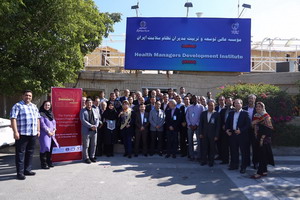 21 November 2018 – The World Health Organization (WHO) in collaboration with the Iranian Ministry of Health and Medical Education has begun a four-day (21–24 November) training of trainers programme on emergency unit management. Taking place at the Health Managers Development Institute (HMDI), Kish Island, its aim is to build the capacity of the relevant institutes and individuals in the country. It is the first programme of its kind in the Region.
21 November 2018 – The World Health Organization (WHO) in collaboration with the Iranian Ministry of Health and Medical Education has begun a four-day (21–24 November) training of trainers programme on emergency unit management. Taking place at the Health Managers Development Institute (HMDI), Kish Island, its aim is to build the capacity of the relevant institutes and individuals in the country. It is the first programme of its kind in the Region.
Dr Christoph Hamelmann, WHO Representative to the Islamic Republic of Iran, in a message to the opening session, underscored the importance of enhancing the resilience of national health systems through integrating emergency and disaster risk management into primary, secondary and tertiary health care. “Resilience is an emerging concept and the resilience of hospitals can be defined as their ability to resist, absorb and respond to the shock of emergencies and disasters, while maintaining critical functionality, and then to recover to their original state or adapt to a new one” he said.
“Therefore, the leadership and management capacity-building of hospital and emergency unit managers in preparedness and response to emergencies, and management of their health care services, is critical for the resilience of health systems” he added.
Dr Hamelmann reiterated that, in addition to their routine functions, emergency units play a critical role in crisis and disaster situations, and the Islamic Republic of Iran has faced a significant number of these in recent decades.
The WHO Representative said that implementation of the training of trainers programme would ultimately build capacity in a standardized way and ensure high quality service delivery throughout the country.
Dr Tavakolli, Head of the Iranian Society of Emergency Medicine, a key national stakeholder, further emphasized the importance of the course and acknowledged the technical support provided by WHO at both country office and regional levels.
Dr Hamid Ravaghi, Regional Advisor for Hospital Care and Management at the WHO Regional Office, highlighted that improving emergency unit management will enhance quality and efficiency, and accelerate the move towards integrated people-centred health services.
Dr Keyhan Golshani, from Isfahan University of Medical Sciences, who was attending the course as a facilitator, noted that the workshop "equips emergency unit managers with the most updated and critical leadership and managerial skills for effective continuous quality improvement”.
The programme aims to train a national cadre of trainers who will assist the Iranian Ministry of Health and Medical Education to enhance hospital emergency unit management, establish a system for training health facility personnel and other relevant stakeholders for emergency unit management according to updated standard protocols, develop a training package to enhance quality training standards in emergency unit management, and introduce and share lessons learnt and international experiences in the area.
The emergency unit is a unique, busy and complex environment that provides emergency care 24 hours a day and seven days a week. The skilled providers that work in emergency units deal with a range of processes and critical situations that confront them with unpredictable decision-making situations in a chaotic environment.
Emergency units are responsible for at least 40% of hospital admissions and sometimes more than 90% in large national referral hospitals. In the Islamic Republic of Iran, the units face significant numbers of natural, environmental and manmade emergencies throughout the year.








